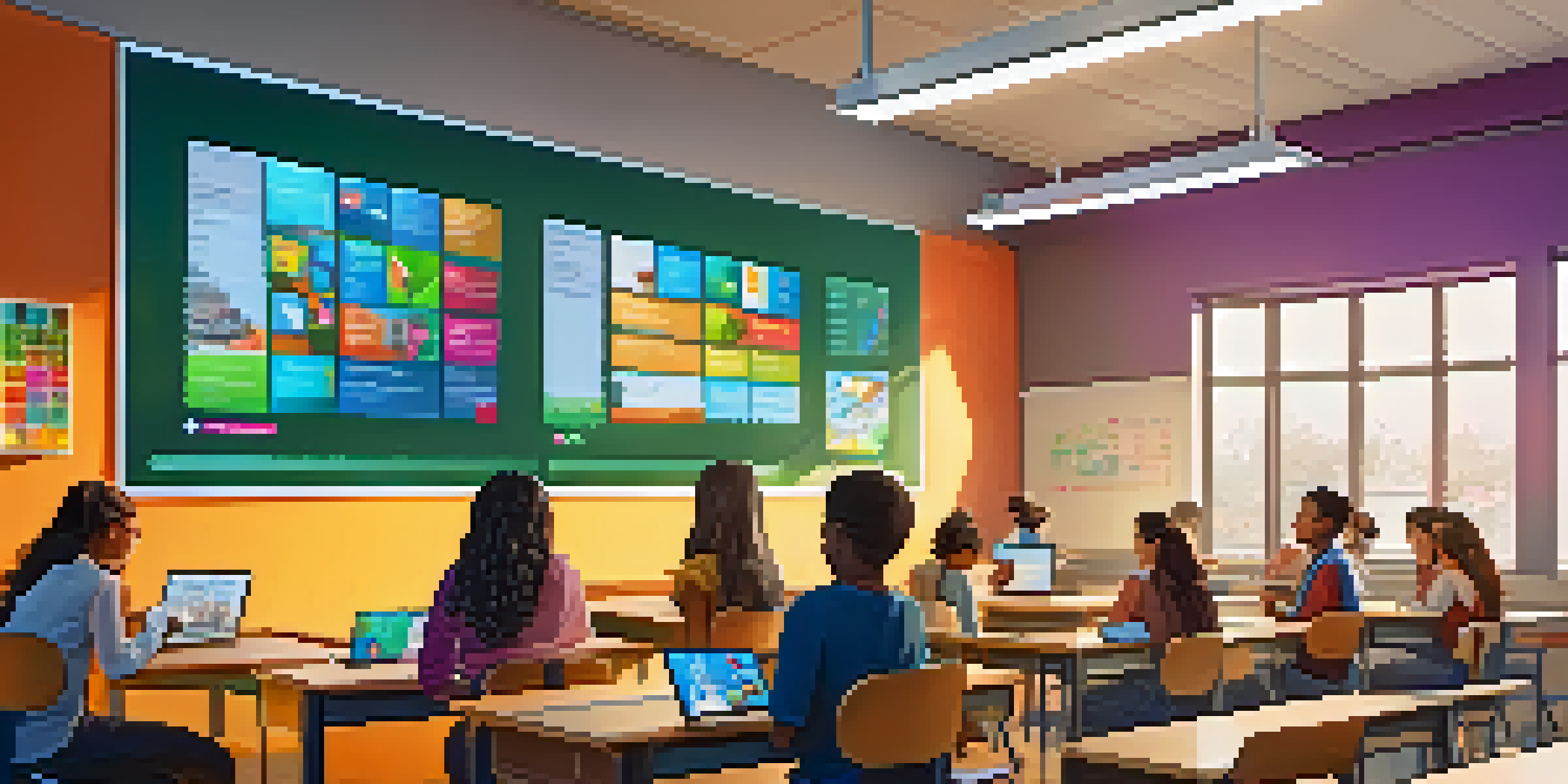The Future of Formative Assessments in Digital Education

Understanding Formative Assessments in Digital Learning
Formative assessments are tools that educators use to gauge student understanding during the learning process. Unlike traditional assessments that evaluate students' performance at the end of a learning unit, formative assessments provide ongoing feedback. This feedback helps teachers adjust their instruction and supports students in identifying their strengths and areas needing improvement.
Formative assessments are not just a tool for teachers; they empower students to take charge of their own learning.
In the context of digital education, formative assessments can take many forms, from online quizzes to interactive polls. These assessments can be integrated seamlessly into digital platforms, making them more accessible and engaging for students. This flexibility allows educators to create a more personalized learning experience that caters to individual student needs.
As digital learning continues to expand, understanding the role of formative assessments becomes crucial. They not only serve as a check-in for educators but also empower students to take charge of their learning journeys. This shift towards a more student-centered approach is likely to define the future of education.
The Role of Technology in Formative Assessments
Technology is transforming formative assessments, providing innovative tools that enhance the learning experience. For instance, platforms like Google Classroom and Kahoot allow for real-time feedback, enabling educators to see which concepts students grasp and which ones need more attention. This immediate insight helps tailor instruction to meet learners' diverse needs.

Moreover, artificial intelligence (AI) is beginning to play a significant role in formative assessments. AI-driven analytics can track student progress over time, offering insights that might not be readily apparent through traditional assessment methods. By analyzing patterns in student performance, educators can make data-informed decisions to improve their teaching strategies.
Formative Assessments Enhance Learning
Formative assessments provide ongoing feedback that helps educators tailor instruction to meet individual student needs.
As we look ahead, the integration of technology in formative assessments will likely increase. This evolution not only enhances the effectiveness of assessments but also fosters a more engaging learning environment. Students are more likely to remain motivated and invested in their learning when technology is leveraged thoughtfully.
Personalized Learning Through Formative Assessments
One of the most significant advantages of formative assessments in digital education is the potential for personalized learning. With the ability to assess students continuously, educators can identify unique learning styles and preferences. This allows them to tailor instruction and resources to meet individual needs, ensuring all students have the opportunity to succeed.
Feedback is the breakfast of champions.
For example, if a teacher notices that a particular student struggles with a specific concept, they can provide additional resources or alternative explanations. This proactive approach contrasts sharply with traditional methods that often leave struggling students behind until the next formal assessment. By personalizing learning, formative assessments can help bridge gaps and foster a more inclusive educational environment.
As the focus on personalized learning continues to grow, formative assessments will play a crucial role in its implementation. By embracing this approach, educators can create a more dynamic and responsive classroom experience that prioritizes student success.
Engagement and Motivation in Digital Assessments
Engagement is key to effective learning, and formative assessments can significantly bolster student motivation. When students receive immediate feedback, they are more likely to feel connected to their learning process. This connection encourages them to take ownership of their education, promoting a growth mindset.
Digital tools often incorporate gamification elements, making assessments more enjoyable. For instance, platforms that use points, badges, and leaderboards can turn assessments into fun challenges rather than stress-inducing tests. This playful approach not only reduces anxiety but also keeps students eager to participate and improve.
Technology Transforms Assessments
Innovative tools like AI and digital platforms facilitate real-time feedback, making assessments more engaging and effective.
As we move forward, fostering engagement through formative assessments will be essential. By creating a stimulating and interactive environment, educators can inspire students to embrace challenges and strive for excellence in their learning journeys.
Challenges and Considerations in Digital Formative Assessments
While the benefits of formative assessments in digital education are clear, challenges remain. One concern is the digital divide; not all students have equal access to technology, which can hinder their ability to participate fully. Ensuring equitable access to resources is essential for the effectiveness of formative assessments in a diverse classroom.
Another challenge lies in the potential for over-reliance on technology. Educators must balance digital assessments with traditional methods to ensure a comprehensive understanding of student progress. Incorporating various assessment types can provide a more rounded view of student performance and learning needs.
As we navigate these challenges, it's vital for educators to remain adaptable. By being aware of these hurdles and actively working to address them, we can ensure that formative assessments continue to evolve in a way that truly benefits all students.
Future Trends in Formative Assessments
Looking ahead, several trends are likely to shape the future of formative assessments in digital education. For instance, the use of adaptive assessments, which adjust in real-time based on student responses, is on the rise. This approach allows for a more tailored assessment experience, ensuring that each student is challenged appropriately.
Additionally, the integration of virtual and augmented reality (VR/AR) into formative assessments is gaining traction. These technologies can create immersive learning experiences that go beyond traditional assessment formats, making learning both engaging and effective. Imagine students participating in a VR simulation that assesses their understanding of complex concepts in a hands-on way.
Personalized Learning is Key
By continuously assessing students, educators can personalize learning experiences, ensuring that all students have the opportunity to succeed.
As these trends emerge, educators will need to stay informed and flexible. Embracing innovation in formative assessments will be key to enhancing the learning experience and preparing students for the future.
The Importance of Continuous Feedback
Continuous feedback is a cornerstone of effective formative assessments. It allows students to understand their progress and make necessary adjustments before moving on to more complex topics. This ongoing dialogue between educators and students fosters a supportive learning environment where questions and clarifications are encouraged.
In digital education, continuous feedback can be delivered instantly through various platforms. For example, online quizzes can provide immediate scores and explanations, helping students learn from their mistakes right away. This immediate reinforcement helps solidify knowledge and builds confidence in their abilities.

As we embrace the future of education, prioritizing continuous feedback will be essential. By ensuring that students receive timely insights into their performance, we can empower them to take charge of their learning journey and achieve their goals.
Conclusion: Embracing the Future of Formative Assessments
The future of formative assessments in digital education is bright, filled with opportunities for innovation and growth. By leveraging technology and adopting personalized approaches, educators can create engaging and effective learning experiences for their students. This shift not only enhances learning outcomes but also fosters a love for learning.
As we continue to explore new assessment methods, it's imperative to keep student needs at the forefront. Balancing technology with traditional approaches, addressing equity concerns, and prioritizing continuous feedback will be crucial for success. By doing so, we can ensure that formative assessments contribute positively to every student's educational journey.
In conclusion, the evolution of formative assessments will shape the landscape of digital education. By embracing this change, we can create an inclusive and dynamic learning environment where all students thrive. The future is bright for formative assessments, and it’s an exciting time for education.